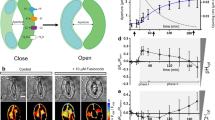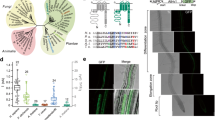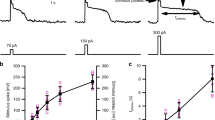Abstract
WHEN plants assimilate CO2 from the atmosphere, water vapour escapes. This exchange of gases can be moderated by the plant through volume changes of guard cells, which in pairs surround each stomatal pore in the epidermis and act as turgor-operated valves. When light intensity diminishes or water stress develops, guard cells shrink and stomata close. This process requires the release of ions from the guard cells. Voltage-dependent K+ chan-nels1,2 provide a path for cations. The required corresponding passage for anions, particularly chloride and malate3, is not known at the molecular level. We have applied the patch-clamp technique4 to guard-cell protoplasts of Vicia faba and found strongly voltage-dependent activities of single anion channels in the plasma mem-brane (plasmalemma). These channels have a conductance of 39 pS in 100 mM KC1 and are permeable for chloride and malate. They become active at membrane potentials positive to −80 mV. Their maximum activity occurs at −40 mV. The resulting outward Cl– currents of individual guard cells are at least 25 pA. These voltage–dependent anion channels provide a mechanism for the control of salt efflux from guard cells.
This is a preview of subscription content, access via your institution
Access options
Subscribe to this journal
Receive 51 print issues and online access
$199.00 per year
only $3.90 per issue
Buy this article
- Purchase on Springer Link
- Instant access to full article PDF
Prices may be subject to local taxes which are calculated during checkout
Similar content being viewed by others
References
Schroeder, J. I., Hedrich, R. & Fernandez, J. M. Nature 312, 361–362 (1984).
Schroeder, J. I., Raschke, K. & Neher, E. Proc. nat. Acad. Sci. U.S.A. 84, 4108–4112 (1987).
Raschke, K. Encyclopedia of Plant Physiology Vol. 7. Physiology of Movements 383–441 (Springer, Berlin/Heidelberg/New York, 1979).
Hamill, O. P., Marty, A., Neher, E., Sakmann, B. & Sigworth, F. J. Pflügers Arch. ges Physiol. 391, 85–100 (1981).
Raschke, K. & Hedrich, R. Meth. Enzym. Vol. 174 (in the press).
Blatt, M. R. Planta 170, 272–287 (1987).
Schroeder, J. I. J. gen. Physiol. 92, 667–683 (1988).
Hille, B. Ionic channels of Excitable Membranes. (Sinauer, Sunderland, Massachussets, 1984).
Schauf, C. L. & Wilson, K. J. Plant Physiol. 85, 413–418 (1987).
Schroeder, J. I. & Hagiwara, S. Nature 338, 427–430 (1989).
Van Kirk, C. A. & Raschke, K. Plant Physiol. 61, 474–475 (1978).
MacRobbie, E. A. C. Bot. Acta 101, 140–148 (1988).
Author information
Authors and Affiliations
Rights and permissions
About this article
Cite this article
Keller, B., Hedrich, R. & Raschke, K. Voltage-dependent anion channels in the plasma membrane of guard cells. Nature 341, 450–453 (1989). https://doi.org/10.1038/341450a0
Received:
Accepted:
Issue Date:
DOI: https://doi.org/10.1038/341450a0
This article is cited by
-
PbrSLAH3 is a nitrate-selective anion channel which is modulated by calcium-dependent protein kinase 32 in pear
BMC Plant Biology (2019)
-
Glutathione-capped quantum dots for plasma membrane labeling and membrane potential imaging
Nano Research (2019)
-
Nature-inspired thermo-responsive multifunctional membrane adaptively hybridized with PNIPAm and PPy
NPG Asia Materials (2017)
-
A molecular pathway for CO2 response in Arabidopsis guard cells
Nature Communications (2015)
-
Differential protein expression profiling of Arabidopsis thaliana callus under microgravity on board the Chinese SZ-8 spacecraft
Planta (2015)
Comments
By submitting a comment you agree to abide by our Terms and Community Guidelines. If you find something abusive or that does not comply with our terms or guidelines please flag it as inappropriate.



